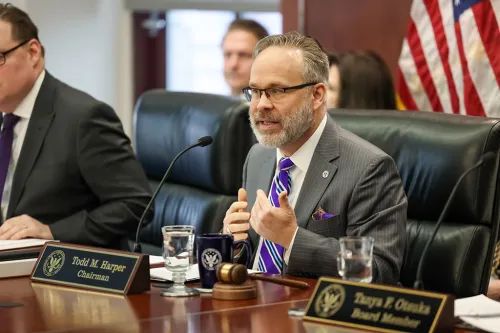NCUA Chairman Todd M. Harper at a meeting of the NCUA Board.
As Prepared for Delivery on July 18, 2024
Thank you, Naghi, for the work of you and your team on the reconsideration of the federal credit union loan interest rate ceiling. I appreciate all your efforts in bringing the interest rate ceiling for federal credit unions before the NCUA Board today. And, thank you, Amanda, for being available to answer any questions.
As noted in the presentation, the NCUA Board in January 2023 last authorized an 18-percent ceiling for the loan interest rate for federal credit unions effective through September 10, 2024. If the NCUA Board doesn’t act today, the maximum interest rate that federal credit unions may charge will revert to 15 percent on September 10.
Specifically, the Federal Credit Union Act requires that the rate of interest a federal credit union can charge may not exceed 15 percent annually. But, in setting this statutory ceiling, Congress also incorporated a regular review process for the NCUA Board to reconsider that ceiling and adjust it under certain conditions after following certain procedures.
Specifically, the NCUA Board may for a period — not to exceed 18 months — determine to exceed the statutory 15-percent rate ceiling after completing the required consultations, reviewing the interest rate environment and market conditions, and completing certain assessments required by the law.
Here, the NCUA team analyzed recent market and financial conditions and concluded that money market rates have risen over the preceding six-month period. That fact comes as no surprise to anyone who has monitored our financial markets and the recent decisions by the Federal Reserve Board’s Federal Open Market Committee.
The NCUA team also completed its required consultation with Congress, the other federal banking agencies, and the Treasury Department. Finally, the NCUA team determined whether the prevailing interest rate levels threaten the safety and soundness of individual credit unions with respect to liquidity, capital, earnings, and growth. Their analysis concluded that lowering the interest rate ceiling below 18 percent would, indeed, be detrimental to certain credit unions.
To that end, the NCUA experts have recommended the NCUA Board vote to establish a temporary maximum loan interest rate ceiling of 18 percent for the 18-month period effective September 11, 2024, through March 10, 2026. I agree with this recommendation and will vote for this item.
Before closing, we must always remember who ultimately feels the effects of these interest rate ceiling decisions. The credit union system’s statutory mission is to support the saving and credit needs of all Americans, especially people of modest means.
With more American households under increasing stress from financial pressures, the NCUA should not place additional and unnecessary burdens on individuals and families by raising the maximum interest rate ceiling that a federal credit union may charge. And, the NCUA should not cause unnecessary safety-and-soundness risks for federal credit unions by inappropriately lowering this rate. This balanced decision is the right one to protect the financial prospects of those who use the credit union system and ensure that the credit union system remains safe and sound.
That concludes my remarks. I now recognize Vice Chairman Hauptman.




